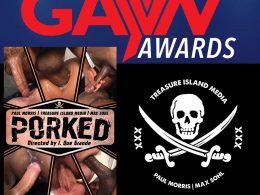
By: Brenden Shucart
I was born in 1981, the same year AIDS was recognized by the Center for Disease Control, and as far back as I can remember fear of contracting HIV has been a part of me. A gnawing anxiety lurking in my heart. Growing up in the ’80s and ’90s there was plenty to feed that fear—unexpectedly deep pop lyrics, made for teevee Lifetime movies, endless fear-based safe-sex campaigns and the odd, half-understood joke on the Kids in the Hall—and precious little to keep it at bay. I knew that AIDS was something that happened to dudes who loved dudes, and when I was being honest with myself, I knew that I was one of those dudes. It felt almost inevitable.
When I came out of the closet in 1997 the first thing my dad said to me was, “I don’t want you to die of AIDS by the time you are 21.” But that fear was already a deeply ingrained piece of my subconscious. Not that it stopped me from having sex. On the contrary, once I had a taste I was insatiable, and I found many, many opportunities to slake my appetite. And I didn’t always use protection. In fact, I was less and less safe as time went by, always dancing closer and closer to the flame. But that fear of getting AIDS was so deeply ingrained in me that whether I used condoms or not almost all of my sexual encounters left me sleepless and sweating, staring at the ceiling and wondering if this was the time that my luck would run out.
Of course it did give out eventually. Play with fire long enough and it’s kind of inevitable that you are going to get burned.
My HIV diagnosis hit me like a ton of bricks. I became severely depressed, and my drug habit became a full-fledged problem. I resigned myself to a lifetime of doctor visits and dependence on antiretroviral medication to keep myself alive, and the pitying/fearful looks that people give you when they think you aren’t paying attention. But I thought, At least there is nothing left to be afraid of. The worst thing that could possibly happen to me has happened.
That was really just a remarkable lack of imagination on my part.
I moved to a new city and fell in love with a guy that was HIV-negative. I started building a new life for myself, and for the most part I was happy. But there was still an anxiety lurking deep down inside.
My fear hadn’t really gone away, it just changed shape. Instead of being afraid I would contract HIV, I found myself living in the fear that I might pass HIV on to someone else.
And when my boyfriend showed up at my place of work, fresh from the clinic with tears in his eyes, that fear consumed me whole.
Contracting HIV wasn’t the worst thing that could possibly happen to me. Letting it get past me was.
To this day I don’t know if I am directly responsible. I was on medication, my viral load was suppressed and we almost always used condoms. Over the course of our three years together we weren’t always monogamous.
But I felt responsible.
I felt toxic.
I felt like a monster.
After that I become a sero-sorter of the strictest kind. It was years before I could bring myself to have sex with a guy who was HIV-negative. Even when I finally did, I was so on guard, so concerned with vigilantly keeping my partner from any possible contamination, performance became an issue. Combined with trouble I had staying hard when I was using a condom, I rarely made the effort.
I took my fear and used it to build a wall between myself and every guy who hadn’t contracted HIV, and buttressed it with my guilt and shame. At some point I accepted, “This is the way it’s always going to be,” just as I had accepted a lifetime of doctor visits and shady looks.
That’s the way it went for quite some time, me deftly avoiding even the opportunity that I might develop feelings for someone who was HIV-negative. Until one day my roommate Kevin came home and told me he signed up for the iPrEx study, a clinical trial to test the efficacy of the antiretroviral drug Truvada as a Pre-Exposure Prophylaxis, or PrEP.
I remember being vaguely hostile to the idea—simultaneously concerned that my friend was being used as a guinea pig, and that this study might somehow get my hopes up only to knock them down.
But as the trial proceeded, and I watched my HIV-negative friend eat his daily dose of medication, and sat and talked with him before and after his regular visits with the clinicians running the study, my suspicion and hostility were gradually supplanted by a kind of hope.
For many of us living with HIV, that’s what the FDA’s approval of Truvada for use as PrEP means—hope. Hope that one day we can let our guard down, be less than perfectly vigilant and love without fear.
Not necessarily Truvada itself, but the promise of things to come that Truvada represents—first a once-a-day pill, then perhaps a pill once a week, or once a month. Maybe an injection that will protect you from HIV for a whole year. Or even a vaccine that will keep a person from contracting HIV for the rest of their lives, and allow those of us who have HIV to set aside our fear forever.
I think I might give anything to make that vaccine a reality. But just having the hope of it means the world to me.
Note: This article does not necessarily represent the opinions of Paul Morris or Treasure Island Media. We felt it right to post, allowing each of you to digest, and form your own opinion. We look forward to hearing what you think.














I was in hospital recovering from a severe reaction to one of truvada’s compnent drugs when news came through that it had been approved in the USA (it’s still being tested in the UK). At first I was pretty hostile to the idea and would only view it as a “proof of concept”, but seeing the difference it’s made to the lives of American friends it’s something I fully support as long as there’s adequate medical support – I went through hell with that reaction and wouldn’t wish it on anyone. But even then there seems to be a difference in reaction to the drug between poz men and neg men, with the latter tolerating it much better than us. The closest I can imagine is when I stopped taking high dose ritonavir and realised how ill it had been making me. The relief of having a reliable protection against HIV must be enormous – just don’t forget to take the pills…